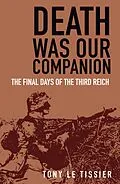As Hitler's dreams of a Thousand Year Reich crumbled in the face of overwhelming assaults from both East and West in the first months of 1945 the heavily out numbered German armed forces were still capable of fighting with a tenacity and professionalism at odds with the desperate circumstances. While Hitler fantasized about deploying divisions and armies that had long since ceased to exist, boys of fifteen, officer cadets, sailors and veterans of the Great War joined the survivors of shattered formations on the front line. Leading historian Tony Le Tissier gives a German perspective to the mayhem and bloodshed of the last months of the Second World War in Europe. Teenaged Flak auxiliaries recount their experiences alongside veteran Panzergrenadiers attempting to break out of Soviet encirclement. Struggles between the military, industry and the Nazi Party for influence over the defenders of Berlin contrast with a key participant's account of Goebbel's abortive attempt to conclude a cease-fire with the Soviets. This is fascinating reading for anybody interested in the ordinary soldier's experience of the culminating battles in central Europe in 1945.
Autorentext
Lt Col TONY LE TISSIER MBE served with the British Army's Royal Corps of Military Police until 1977. He was British governor of the infamous Spandau Prison in Berlin from 1981 to 1987. Tony is the author of many books on the Second World War including 'With Our Backs to Berlin'.
Klappentext
Hitler's dreams of a Thousand Year Reich may have been crumbling by 1945, but his armed forces were not surrendering. While the Führer fantasized about deploying divisions and armies that had long since ceased to exist, boys, officer cadets, sailors and veterans of the Great War joined the survivors of shattered formations on the front line.AA
In Death Was Our Companion, leading historian Tony Le Tissier gives a German perspective to the mayhem and bloodshed of the last months of the Second World War. From teenaged Flak auxiliaries trying to break out of Soviet encirclement to insider accounts of Goebbels' attempt to orchestrate his own cease-fire, this is fascinating reading for anyone interested in the ordinary soldiers of 1945.
